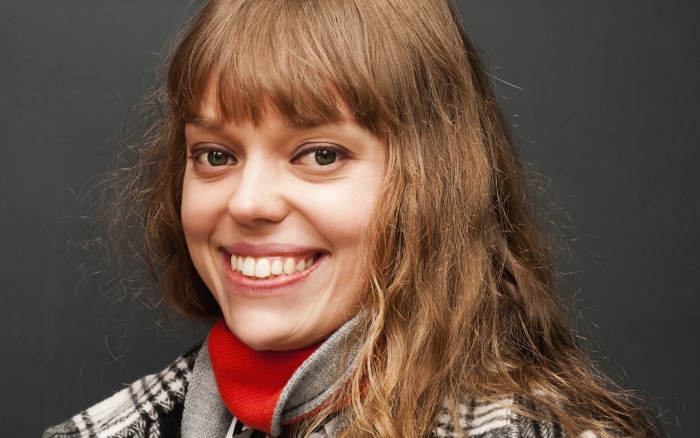A restlessly undulating violin and piano figure opens Nico Muhly’s Doublespeak, written for Eighth Blackbird in celebration of Philip Glass’s 75th birthday. The 2012 work is the oldest on the programme the award-winning new music ensemble is touring across Australia for Musica Viva, but its influences hark back even further to the Minimalism of the 1970s.
The slap of bow on strings underpins Muhly’s music driven forward by Yvonne Lam on violin, interspersed with more relaxed passages in which ethereal piccolo lines (Nathalie Joachim) give the music a hazier texture. Muhly borrows an excerpt from Glass’s Music in Twelve Parts, which gradually comes to the fore, replacing turbulent flute and vibraphone lines with a dream-like – almost Spectral – tranquillity.
Bryce Dessner’s Murder Ballades swings into action with a jaunty piano and clarinet duet. Dessner – better known as the guitarist with US band The National – wrote this work for Eighth Blackbird in 2013, drawing on and reimagining the American folk tradition of ‘murder ballads’. Since Eighth Blackbird recorded Murder Ballades on their 2015 album Filament, Dessner has expanded the work with several extra movements.
The serene melody of Young Emily is interspersed with quick, slinky slides echoed in the brighter, pluckier Hocket that follows. In Dark Holler, Adam Marks’ piano sound is altered to imitate the twang of a banjo, flute and violin floating above the rattling. Nicholas Photinos’ cello trades ember-like harmonics with Lam’s violin before the cellist takes centre in Lewisburg. One of the new additions to the work, the fearsome cello solo sees Photinos digging deep as his frenzied bowing produces a distant roar of harmonics. Joachim’s rhythmic alto flute playing drives Wave the Sea, spattered with percussion and hammering bass drum from Matthew Duvall.
Murder Ballades culminates in Tears for Sister Polly, an anxious dance of cello, piano and marimba, flecked with accompanying figures from the clarinet, violin and flute. The repetitive lyric-less songs extend naturally from the post-Minimalist ambience of the Muhly, giving the concert’s first half a sense of relentless, roiling momentum.
 Australian composer Holly Harrison. Photo © Marije van den Berg
Australian composer Holly Harrison. Photo © Marije van den Berg
The centrepiece of Eighth Blackbird’s touring programme is Australian composer Holly Harrison’s Lobster Tales and Turtle Soup, commissioned by Musica Viva with support from Geoff Stearn and the Hildegard Project. Inspired by the Mock Turtle and the Gryphon from Lewis Carroll’s Alice’s Adventures in Wonderland, Harrison’s work opens with a jazzy cacophony. Full of lurching rhythms and quirky bass clarinet solos from Michael Maccaferrri, Lobster Tales brings to life the bickering arguments and absurdities of Carroll’s scenes in an eclectic, joyful onslaught.
Duvall dispatches shuffling rhythms on kit with subtlety and a casual dexterity in the softer moments, but the balance becomes a bit kit-heavy in the louds, the other instruments becoming swamped at times. A couplet from the novel – “’Will you walk a little faster?’ said a whiting to a snail. ‘There’s a porpoise close behind us, and he’s treading on my tail.’” – is spoken in full and in fragments by the musicians, the rhythms echoing the cadence of the syllables and channelling the frustrated forward momentum of the words. The mood changes on a dime, with a sighing duet from violin and piano giving way to vigorous bass clarinet grooves and percussive flute rhythms accompanied by bluegrassy pizzicato cello.
The ramped up intensity of Harrison’s work is sustained in Ted Hearne’s energetic – if darker – By-By Huey. Hearne’s work takes inspiration from Robert Arneson’s painting of the same name, a portrait of Tyrone Robinson, who killed Huey Newton, co-founder of the Black Panthers. Self-destruction is a theme that runs through the work and the instruments are muted or muzzled in various ways, the strings of the piano dampened to varying degrees to create semi-pitch and un-pitched beating rhythms.
Opening with light melodic fragments that are soon pierced by keening violin tremolos, the work alternates raging crescendos and heavy silences, siren-like slides from the bass clarinet and motoring percussion driving the music forward. A recapitulation sees the return of the opening’s sweeter melodies, still torn by percussive accents. There is some catharsis in the piano coda, however, an improvisatory passage in which the violent interjections become pitched and soften into accents that add a richness to the bluesy sound.
The final work on the programme also takes its inspiration from an artwork, Timo Andres’ Checkered Shade drawing on a detailed pen-and-ink abstraction by Astrid Bowlby. Imagined as a gradual ‘zoom out’ on the artwork, the music is all glittering, bubbling layers and gradually shifting tones – a gently, atmospheric Minimalism that expands to bright, shining pastoral figures.
Eighth Blackbird’s tight-as-a-drum ensemble work and focussed energy gives the entire programme an irresistible momentum, but it is Harrison’s work that really shines – an exuberant musical feast that both delights and provides a clever fulcrum on which the intensity of the programme shifts.
Eighth Blackbird is on tour for Musica Viva until March 9











Comments
Log in to join the conversation.